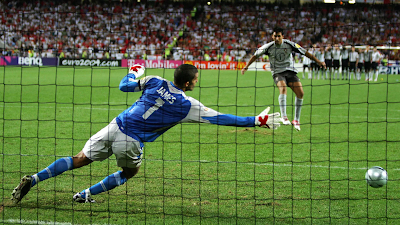England’s Golden Generation and the Quarter-Final Curse
Many have rejoiced at English heartbreak in recent years. Harry Kane’s missed penalty in Qatar. Gianluigi Donnarumma saved Bukayo Saka’s spot kick at Wembley. Mario Mandžukić’s extra-time heroics in Moscow. But truth be told, each of those heartaches was actually an improvement on those from years gone by.
Let’s face it, despite a favourable run five years ago, no one really expected an upstart Three Lions side featuring the likes of Dele Alli, Ashley Young, and Jesse Lingard to reach the final four in Russia. Despite being on home turf three years later, no one expected England to reach their first major final since 1966 in the delayed European Championships. And even though they were eliminated, no one expected Gareth Southgate’s side to dominate reigning world champions France the way they did in the Arabian Gulf late last year.
Those expectations however will be upped somewhat at UEFA Euro 2024 in Germany. The English are 11/2 (+550) second favourites for glory according to online sports bookies at next summer's tournament, and with the competition expected to be the last of manager Gareth Southgate’s relatively successful spell in charge, many are hoping that the former England international defender can sign off with a piece of silverware. But high expectations are something he has not yet had to deal with.
The same, however,
cannot be said of his country’s golden generation. In 2002 and the years
immediately subsequent, Old Blighty had a conveyor belt of talent producing the
likes of Wayne Rooney, Steven Gerrard, Frank Lampard, and Rio Ferdinand,
amongst many others. To the amazement of many, however, they never made it past
the quarterfinals of a major tournament. So, what went wrong?
5-1
Thumping of Germany Announces England’s Return as a Major Force
At the turn of the millennium, the Three Lions were reeling. A 1-0 defeat at the hands of the Germans in the final game at the old Wembley saw Kevin Keegan relieved of his duties as manager, and the future looked bleak. However, income former Swedish manager Sven-Göran Eriksson, and immediately transformed his adopted nation’s fortunes. He handed the captain’s armband to a newly matured David Beckham, and he looked towards Liverpool trio Michael Owen, Steven Gerrard, and Emile Heskey to power the team forward.
The results
instantly picked up, and they culminated in one magical night in Munich. The
Three Lions headed to the home of their greatest rivals with an inexperienced
side that was certainly the underdog. However, goals for each member of the
Merseyside trident - including a blistering hat-trick from Owen - saw England
run out 5-1 winners. They would carry that momentum into the 2002 FIFA World
Cup, where they would get revenge over the team that eliminated them from the
previous World Cup, Argentina.
England met their
South American rivals in the group stage, and a Beckham penalty was enough to
secure the victory and send the Albiceleste packing before the knockout rounds.
Then, Becks and Co. would give eventual winners Brazil all they could manage in
the quarterfinals, where they would ultimately fall to a 2-1 defeat. But the
future was certainly bright, or so we thought.
The
Portuguese and Their Penalties
Two years on from
that Brazil defeat, England headed to Euro 2004 in Portugal as one of the favourites
to win the tournament. They dominated France in the opening game only for a
late double salvo from Zinedine Zidane to steal the victory for Les Bleus.
Inspired by a teenage Wayne Rooney however, the Three Lions would dominate
against Croatia and Switzerland to set up a quarterfinal against the hosts.
And it was a
last-eight tussle that it looked like England would win following Michael
Owen’s early goal. However, a first-half injury to Rooney saw the wheels come
off, and Portugal would manage to find a late equalizer through Hélder Postiga.
In extra time, they would take the lead through Rui Costa, before a last-gasp
Frank Lampard strike to the tie to penalties. There, they would run into
maverick shot-stopper Ricardo for the first time. The Sporting Lisbon man saved
from Darius Vassell, before slamming home himself and leaving the hosts to
celebrate long into the night.
Two years later,
the pair met again in the quarterfinals of the 2006 World Cup in Germany. This
time, however, England had stuttered through the tournament and the talismanic
Rooney was noticeably not match-fit. He was promptly sent off in the rematch
for a stamp on Ricardo Carvalho late in the second half, and Ricardo would save
penalties from the usually reliable Gerrard and Lampard to send his nation to a
first semifinal in 40 years.
Conclusion
In recent times,
many stars of the Golden Generation have stated that the tactical ineptness of
manager Eriksson was to blame for England’s poor performance. The Swedish boss
simply instilled a flat 4-4-2 formation and from what the likes of Gerrard,
Lampard, Ferdinand, and Joe Cole have said during their punditry work, he
wouldn’t provide many instructions to his players. Instead, he relied on their
individual talent to somehow bring forth victories.
Many have also
looked to his inability to utilize the likes of former Manchester United
midfielders Paul Scholes and Michael Carrick as another reason as to why
England faltered. It is one of football’s greatest mysteries as to how such a
talented team failed to live up to the hype. Southgate will hope his talented crop of young lions doesn’t falter
once more next summer.





Comments